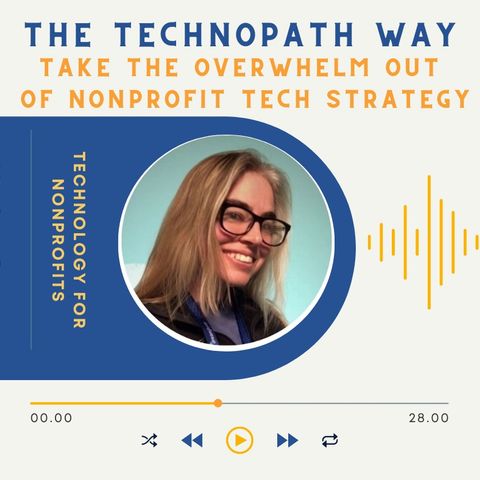What is Data Literacy? with Ruby Menon

Download and listen anywhere
Download your favorite episodes and enjoy them, wherever you are! Sign up or log in now to access offline listening.
Description
Sign up for our weekly newsletter, The Technopath Way Tips, here: echnopath.ac-page.com/the-technopath-way-sign-up Ruby Menon’s non-linear career path has equipped her with the many diverse skills she bring to help small...
show moreRuby Menon’s non-linear career path has equipped her with the many diverse skills she bring to help small to medium sized nonprofits leverage their systems, incoporate technology and shift mindsets internally to collect better data and drive more consistent outcomes.
Currently Ruby is a consultant helping small to medium sized nonprofits with their technology and data needs. She and her husband work with incarcerated people to help them rejoin society after their release through her husband’s nonprofit: worknetinc.org
Today Sarah sat down with Ruby to learn about what data literacy means in terms of smaller nonprofits, small steps you can take to start collecting better data and ways to get more staff buy in for big technology shifts.
Ruby’s Tips to Increase Data Literacy for your organization:
* Establish what it means to be ‘data literate’ in your organization
* Know where your data flows from
* Know where you want to display it (for funders, for volunteers, for stakeholders)
* Be able to distinguish important data points from vanity metrics
* Work backwards from the outcomes you want to achieve
* Desired Outcome: You want to have every contact associated with a company
* Current Situation: Hundreds of contacts with no comapny association
* Why is this? The organization is not asking for employer details on in-take forms (or not making question required)
* Fix: Create a field on the organization’s in-take form for employer details and make it a required field so the form cannot be submitted without that information.
* Map out your processes as clearly as possible. This one has lots of benefits
* Hand-off to new team members is easier because there is an objective, pre-determined list to give the new person
* You’ll be able to determine what data points you actually need
* Can simplify the build out of new data tracking systems
* Understand where your data is coming from
* Which forms are you using to collect information
* What questions are being asked
* Why are these data points being collected?
* Being data literate cuts down on the need to clean your data later as you are already collecting relevant, complete data
Information
| Author | Sarah Epting |
| Organization | Sarah Epting |
| Website | - |
| Tags |
Copyright 2024 - Spreaker Inc. an iHeartMedia Company

Comments